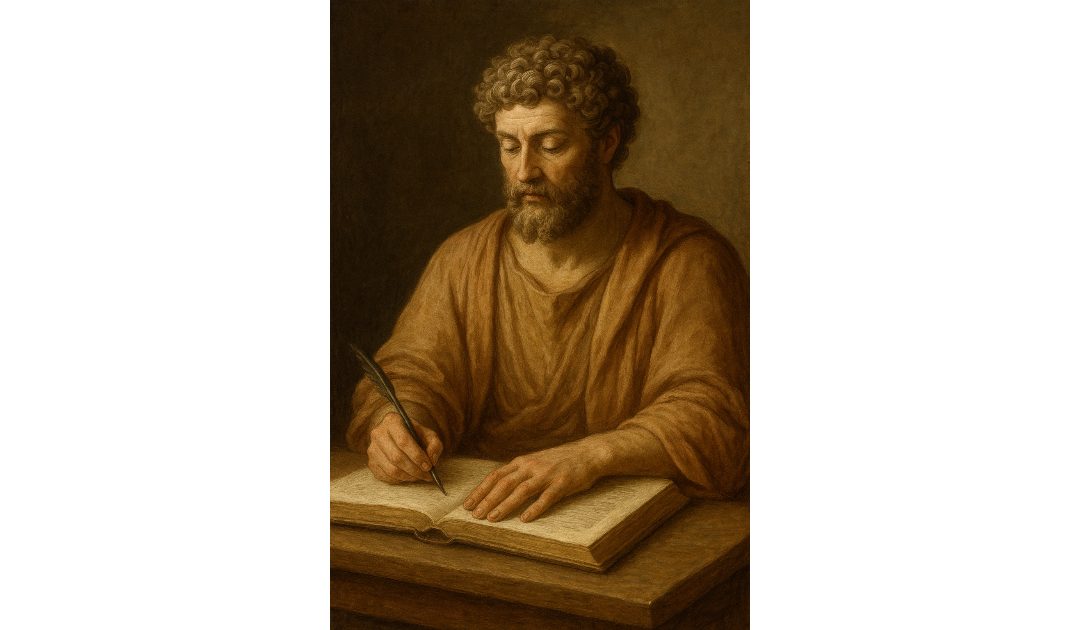On the 27th of November, 176 CE, Marcus Aurelius granted his son, Commodus, the rank of Imperator, and made him Supreme Commander of the Roman legions. I have written about Commodus before, and the Miracle of the Rain, but there must be more we can explore about Marcus Aurelius.
Marcus Aurelius (121–180 CE) was a Roman emperor and Stoic philosopher whose life and writings have had a profound and lasting impact on philosophy, political thought, and the understanding of personal virtue. Born on the 26th of April, 121 CE, into a prominent and wealthy Roman family, Marcus Annius Verus, as he was originally named, was adopted by Antoninus Pius in 138 CE, following the wishes of the then-emperor Hadrian. This adoption secured his path to the imperial throne, marking the beginning of a life that intertwined the heavy responsibilities of leadership with a deep commitment to philosophical reflection.
From an early age, Marcus showed a natural inclination towards study and introspection. He was educated in rhetoric, law, literature, and especially philosophy, which quickly became his guiding framework. Stoicism, a school of thought founded in Athens by Zeno of Citium in the early 3rd century BCE, emphasised rationality, self-discipline, and alignment with nature as the path to inner peace. Marcus found in Stoicism a way to navigate the turbulent demands of life and imperial duty. He came to believe that while humans cannot control external events, they can control their reactions to them through reason and virtue.
Marcus Aurelius became co-emperor with his adoptive brother Lucius Verus in 161 CE, taking on the immense burden of ruling the Roman Empire at a time of both prosperity and crisis. His reign was marked by a combination of external threats and internal challenges. Among the most notable of these were the Parthian War in the East, which Lucius Verus primarily managed, and a series of conflicts along the northern frontiers, including the Marcomannic Wars against Germanic and Sarmatian tribes. These wars placed a great strain on the empire’s resources and on Marcus himself, who spent much of his later life commanding troops on the frontiers rather than in the comfort of Rome.
In addition to military challenges, Marcus’s reign was overshadowed by the Antonine Plague, which swept through the empire, bringing widespread mortality and social disruption. Despite these hardships, Marcus was renowned for his sense of duty and his attempts to govern justly. He was often regarded by contemporaries and later historians as the embodiment of Plato’s ideal philosopher-king: a ruler guided by wisdom, self-restraint, and a deep sense of moral responsibility.
Marcus Aurelius’s most enduring legacy is his personal writing, a series of reflections known today as the Meditations. Composed in Greek during his military campaigns, these writings were never intended for publication. They are a private journal of philosophical exercises, reminders to himself of how to live according to Stoic principles, and meditations on the fleeting nature of life, the inevitability of death, and the importance of virtue over glory or wealth. In the Meditations, Marcus continually reminds himself to accept the order of the universe and to act with justice, courage, temperance, and wisdom, regardless of the chaos surrounding him.
The Stoic themes that permeate the Meditations—impermanence, self-discipline, empathy, and the cultivation of inner tranquillity—resonate powerfully even today. He urges himself to meet adversity without complaint, to forgive the failings of others, and to remember that fame and fortune are ephemeral. His words reveal a man burdened by the weight of power and loss, yet determined to live a life of integrity, guided by reason.
Marcus Aurelius died on the 17th of March, 180 CE, in Vindobona (modern-day Vienna) or possibly in Sirmium, while on campaign against the northern tribes. His death marked the end of the Pax Romana, the long period of relative peace and stability in the empire. He was succeeded by his son Commodus, whose reign would be infamous for its corruption and instability, a stark contrast to his father’s disciplined and philosophical rule.
Through the centuries, Marcus Aurelius has been admired as both a leader and a thinker. Renaissance humanists rediscovered his writings, Enlightenment philosophers praised his rationalist outlook, and modern readers continue to find in his Meditations a source of solace and guidance. He exemplifies the ideal of governing not as a pursuit of power or personal gain, but as a moral duty carried out with humility and wisdom. Today, Marcus Aurelius stands as a timeless figure: a Stoic emperor whose reflections on life, virtue, and mortality speak across the ages, reminding us that even in the face of immense responsibility and inevitable suffering, the pursuit of inner excellence remains the highest calling.

